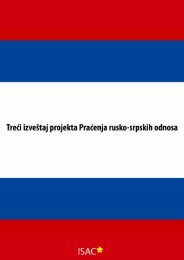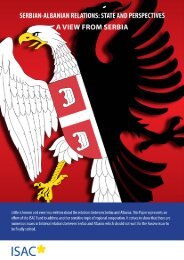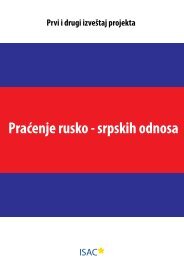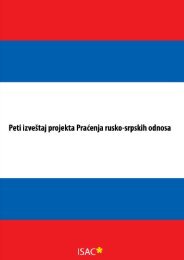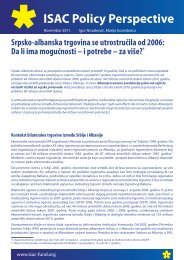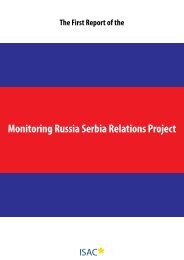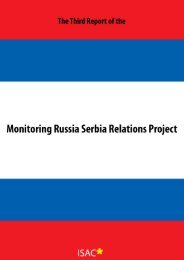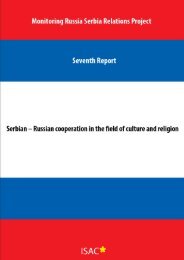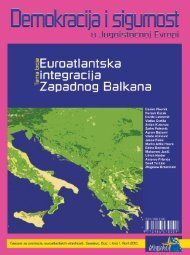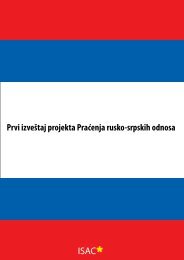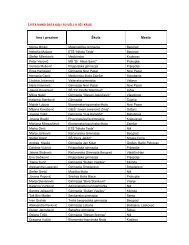the process of security sector reform - ISAC Fund
the process of security sector reform - ISAC Fund
the process of security sector reform - ISAC Fund
You also want an ePaper? Increase the reach of your titles
YUMPU automatically turns print PDFs into web optimized ePapers that Google loves.
George Katsirdakis SECURITY SECTOR REFORM FROM A NATO VIEWPOINT<br />
George Katsirdakis SECURITY SECTOR REFORM FROM A NATO VIEWPOINT<br />
attacks in <strong>the</strong> United States. The perception was that terrorism and asymmetric<br />
threats cannot be countered effectively by simply using traditional armed forces<br />
or traditional forces <strong>of</strong> law and order and internal <strong>security</strong>. The need for a<br />
systemic approach was evident. What was not clear, however, was how this<br />
systemic approach to adapt <strong>the</strong> entire <strong>security</strong> <strong>sector</strong> to <strong>the</strong> new <strong>security</strong> challenges<br />
could be implemented in practice. Some Allies were <strong>of</strong> <strong>the</strong> view that<br />
since NATO was established as a collective defence organisation, its role in <strong>the</strong><br />
overall <strong>reform</strong> <strong>process</strong> <strong>of</strong> <strong>the</strong> <strong>security</strong> <strong>sector</strong> should be limited only to one part<br />
<strong>of</strong> <strong>the</strong> <strong>security</strong> <strong>sector</strong> where NATO was generally considered most competent<br />
– <strong>the</strong> defence <strong>sector</strong>. These Allies maintained that <strong>the</strong> <strong>reform</strong> <strong>of</strong> <strong>the</strong> non-defence<br />
<strong>sector</strong> organisations was not in NATO’s competence and should be left to o<strong>the</strong>r<br />
international organisations such as <strong>the</strong> European Union and <strong>the</strong> OSCE.<br />
O<strong>the</strong>r Allies challenged that view by saying that in <strong>the</strong> fight against terrorism and<br />
asymmetric threats <strong>the</strong>re is a need to have a systemic approach and integrated and<br />
well coordinated plans to be able to succeed and in that approach <strong>the</strong> role <strong>of</strong> <strong>the</strong><br />
armed forces and that <strong>of</strong> <strong>the</strong> <strong>security</strong> forces should be seamlessly integrated and<br />
act as an integrated system and not along <strong>the</strong> lines <strong>of</strong> organisational competencies.<br />
As <strong>the</strong>y argued, we cannot share intelligence with military intelligence services<br />
only because civilian intelligence services should be working with <strong>the</strong> EU and<br />
not with NATO. If NATO is to be in charge <strong>of</strong> an operation it should be able to<br />
utilise <strong>the</strong> whole potential <strong>of</strong> <strong>the</strong> <strong>security</strong> <strong>sector</strong> and, <strong>the</strong>refore, <strong>the</strong> SSR would be<br />
a strategic necessity for NATO operations in <strong>the</strong> future against terrorist or o<strong>the</strong>r<br />
organisations that pose a serious threat against <strong>the</strong> <strong>security</strong> <strong>of</strong> an Ally or a Partner.<br />
And, if organised crime was supporting terrorism, as <strong>the</strong> general perception was,<br />
<strong>the</strong>n NATO operations to combat terrorism could not exclude operations against<br />
organised crime.<br />
To this day, unfortunately, this debate has not culminated to a consensus approach<br />
and although some progress has been made towards adopting SSR as a legitimate<br />
area <strong>of</strong> NATO activity, more work will be required in <strong>the</strong> near future.<br />
Against this background, <strong>the</strong> first <strong>of</strong>ficial reference to SSR in NATO documentation<br />
was made in <strong>the</strong> Prague Summit Declaration, in November 2002, where<br />
<strong>the</strong> Heads <strong>of</strong> State and Government, referring to <strong>the</strong> developments in <strong>the</strong> Balkans,<br />
agreed “to improve <strong>the</strong>ir capacity to contribute to Albania’s continued <strong>reform</strong>,<br />
and to fur<strong>the</strong>r assist defence and <strong>security</strong> <strong>sector</strong> <strong>reform</strong> in <strong>the</strong> former Yugoslav<br />
Republic <strong>of</strong> Macedonia”.<br />
During <strong>the</strong> same Summit meeting, <strong>the</strong> Heads <strong>of</strong> State and Government agreed<br />
a very important document for <strong>the</strong> future <strong>of</strong> <strong>the</strong> Partnership, <strong>the</strong> Report on <strong>the</strong><br />
Comprehensive Review on EAPC and PfP. The report anticipated <strong>the</strong> development<br />
<strong>of</strong> a specially designed Partnership Action Plan (PAP) as “an issue-specific, result<br />
oriented mechanism for practical cooperation involving Allies and interested<br />
Partners”. The Review fur<strong>the</strong>r states that Allies should “…consider possible new<br />
measures to facilitate and harmonise operational co-operation between <strong>security</strong><br />
structures including those beyond <strong>the</strong> responsibilities <strong>of</strong> respective MODs”.<br />
The discussions in NATO in relation to <strong>the</strong> requirement stated in <strong>the</strong> Prague Summit,<br />
focussed on issues <strong>of</strong> restructuring, capabilities, cooperation and training<br />
<strong>of</strong> <strong>the</strong> various organisations <strong>of</strong> <strong>the</strong> broader <strong>security</strong> <strong>sector</strong> that might need to<br />
work closely to fight <strong>the</strong> new <strong>security</strong> threats.<br />
In an effort to bridge <strong>the</strong> gap in <strong>the</strong> views <strong>of</strong> Allies on <strong>the</strong> SSR issue, all Allies<br />
agreed that <strong>the</strong>re is a need for cooperation <strong>of</strong> NATO with <strong>the</strong> EU and <strong>the</strong> OSCE<br />
to ensure coordination. In <strong>the</strong> same light, it was agreed that NATO’s primary<br />
interest in a cooperative approach with o<strong>the</strong>r international organisations, would<br />
be in <strong>the</strong> Defence Sector and in an effective interface with <strong>the</strong> <strong>security</strong> <strong>sector</strong>’s<br />
o<strong>the</strong>r actors.<br />
The debate also considered a possible introduction <strong>of</strong> a new area <strong>of</strong> cooperation<br />
in <strong>the</strong> Partnership Work Programme (PWP) on Border Security considering<br />
that NATO had been repeatedly and extensively involved in <strong>the</strong> issue <strong>of</strong> Border<br />
Security both in <strong>the</strong> Balkans and in o<strong>the</strong>r Partnership regions. The close<br />
coordination between NATO, <strong>the</strong> EU, <strong>the</strong> OSCE, <strong>the</strong> Stability Pact, <strong>the</strong> See-<br />
GROUP, and DCAF for <strong>the</strong> case <strong>of</strong> <strong>the</strong> Ohrid Conference on border <strong>security</strong>,<br />
in <strong>the</strong> summer <strong>of</strong> 2002, indicated that this might be a genuine area <strong>of</strong> <strong>security</strong><br />
<strong>sector</strong> activity where all <strong>the</strong> co- organisers – being international entities – could<br />
work closely toge<strong>the</strong>r and coordinate <strong>the</strong>ir activities.<br />
In <strong>the</strong> internal debate as to how to proceed with <strong>the</strong> issue <strong>of</strong> SSR, ano<strong>the</strong>r important<br />
development was <strong>the</strong> consideration <strong>of</strong> <strong>the</strong> possibility <strong>of</strong> agreeing on a<br />
Partnership Action Plan on Defence and Security Sector Reform PAP-DSSR.<br />
In <strong>the</strong> same vain, ano<strong>the</strong>r option could be <strong>the</strong> use <strong>of</strong> <strong>the</strong> Planning and Review<br />
Process (PARP) to explore <strong>the</strong> possibility <strong>of</strong> developing and proposing to<br />
Partner-nations <strong>of</strong> some Partnership Goals on DSSR. Fur<strong>the</strong>rmore, realising<br />
60 61



